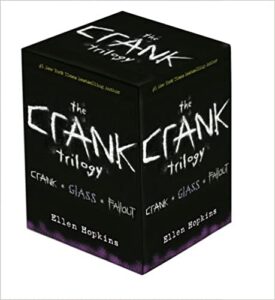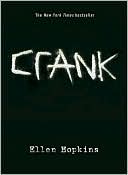 The Crank Trilogy by Ellen Hopkins ( Bookshop.org | Amazon.com )
The Crank Trilogy by Ellen Hopkins ( Bookshop.org | Amazon.com )
We are revisiting our reviews of the Crank trilogy today, due to a recent challenge to Crank in my own school district (you never REALLY think it will happen in your area until it does). Yesterday we published an interview of Ellen Hopkins from our vault, which I hope you’ll read. Today, we present our reviews of The Crank Trilogy, consisting of Crank, Glass, and Fallout.
Crank by Ellen Hopkins
Margaret K. McElderry Books, 2010 (Reprint edition)
ISBN-13 : 978-1416995135
Available: Hardcover, Kindle edition, audiobook. ( Bookshop.org | Amazon.com )
Crank is Ellen Hopkins’ controversial, and sorely needed, verse novel. Kristina Snow’s life changes forever when her father and the boy she’s crushing introduce her to meth. Unlike Impulse, which is raw and shredding in its emotion, Crank is almost cold at times, brutally showing a girl on the edge of being a woman, who should have the kind of life that discourages drug use, choosing to ride with the monster time after time. Likewise, the people in her life who should be able to step in, fail, leaving Kristina alone to fight a beast that defeats most adults.
Crank is a difficult book to handle, but it’s far closer to reality than any drug awareness program I went through in school. Hopkins’ books are strongly positioned to be of great value as fiction, as poetry, and for their educational value, as they boldly strip away pretenses and sensitivities to show addiction as the cruel master it is. Highly recommended for public collections as well as recommended reading material for those whose lives have been scarred by the real life monsters on our streets.
Contains: sex, language, drug use, rape
Glass by Ellen Hopkins
Margaret K. McElderry Books, 2009 (Reprint edition)
ISBN-13: 978-1416940913
Available: New and Used ( Bookshop.org | Amazon.com )
Glass is the direct follow up to Crank. Glass continues the story of Kristina Snow after she’s had her baby, and kicked meth and nicotine, shortly before her eighteenth birthday. It follows her relapse in her struggle with the meth monster and goes farther than Crank imagined. Sharp and painful, Glass is hard to read. For one, Kristina seems to not even care that she’s making such horrible mistakes. Almost on autopilot in her quest to fill simple needs, this reader more than once wanted to reach into the lines and try to shake some sense into her.
While Crank goes very far to combat drug use as an introductory tale, Glass is Anti-Drug 201, a hardcore look at more of the nasty side effects of addiction, as good as an uncut marathon of Intervention with viewers thrust, uncomfortably, inside Kristina’s head. There’s no doubt it will be too much for many readers, either too brutal, or too close to home. Hopkins savagely slices through any illusions of “normal life” with beautiful poems and style that makes the story she’s telling all the more horrific. Highly recommended.
Contains: sex, drug use, language, domestic violence
Reviewed by Michele Lee
Fallout by Ellen Hopkins
Margaret K. McElderry Books, 2010
ISBN-13: 978-1416950097
Available: New and Used ( Bookshop.org | Amazon.com )
In Fallout, the third book in the series that started with Crank, centered on meth addict Kristina Snow, Hopkins moves on to show the effect Kristina’s selfish ways still have on her children, and covers a wide spectrum of emotional and psychological problems. Fallout is told through three narrators: Hunter, Kristina’s first child, born of rape and trying to deal with rage; Autumn, who struggles with OCD and turns to alcohol to get her through a major life change; and Summer, who is unaware that she has siblings, and has been raised by a series of abusive foster homes and her own addict father.
Fallout is raw, as can be expected from Hopkins, sharp and yet beautiful as well. Hopkins manages to bring new sympathy to the subject, even to characters readers are already familiar with and have started to hate. While the full scope of the story would be missed if readers started the series here, this is the book that will most call to the loved one or friend struggling to support (or justify not supporting) an addict. Highly recommended.
Contains: drug use, sex, language
Reviewed by Michele Lee







Follow Us!